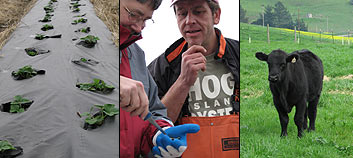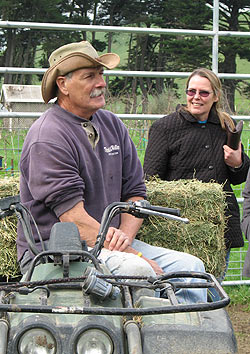Berkeleyan
 |
From left: Plastic sheeting protects "Russellberries" from the February chill; Prying a Hog Island oyster from its shell; A Black Angus cow at Chileno Valley Ranch. (Tracy Lenihan and Wendy Edelstein photos) |
Down on the Farm
![]()
| 10 March 2005
For the second year running, Lynn Huntsinger, an associate professor of environmental science, policy, and management in the College of Natural Resources, has offered a Freshman Seminar called "Follow Your Food." The idea for the class originated with Huntsinger's interest in the relationship between food marketing and the environment, specifically as it relates to her academic focus, rangeland ecology and management. Her goal is "to not only explore where food comes from but also examine how it's connected to our community and environmental well-being."
 Mike Gale, co-owner of Chileno Valley Ranch, with CNR Associate Professor Lynn Huntsinger. "I think one of the ways we can protect our environment is to make the right choices about what we consume," she says. |
With the morning's purchases packed into coolers, the class piled into a chartered bus and headed off to West Marin. Along for the ride was Professor Sally Fairfax, Huntsinger's colleague, who is working on a book about the Bay Area's "alternative foods" - those grown locally, without added chemicals, and produced in an environmentally sustainable manner.
The first stop was Chileno Valley Ranch in Petaluma, where Sally and Mike Gale raise beef cattle. The Gales converted what was once a traditional beef operation to a grass-fed ranch three years ago. Since then they have sold out their beef each year - no mean feat, since they only sell split-quarters, half, or whole cows to individuals. The couple also grows nine varieties of apples in a small orchard on their property.
 All six organic cheeses produced by Marin's Cowgirl Creamery have won first prizes at the American Cheese Society's annual competition. |
At the third stop, Hog Island Oyster Company in Marshall, the group got a lesson in oyster cultivation and shucking. Hog Island began farming West Coast oysters 23 years ago. Today they sell more than 3 million of the succulent bivalves annually and have won numerous kudos, including the Award of Excellence for Animal Husbandry from the American Institute of Food and Wine. Even Huntsinger, who had never sampled a raw oyster before, got swept up in the fervor and downed a Hog Island Sweetwater.
At Sartori Strawberries, the final farm stop, Russell Sartori told the class about selling his herd of dairy cows four years ago and focusing his attention on organic strawberries. "Russellberries," as they've come to be known, are now a much-sought-after item renowned for their sweetness. Unfortunately, the class was about six weeks too early to sample this year's crop.
At 6 p.m. the group headed back to Huntsinger's East Bay home, where they feasted on cheeses, hamburgers, salad, potatoes, vegetables, and pies - all prepared with ingredients purchased at that morning's farmers market.
"The argument against this way of eating is that it's more expensive," said Huntsinger about the meal the class just finished. "In general we might do better in terms of our health if we chose a little more carefully, paid a little more, and ate a little less."

